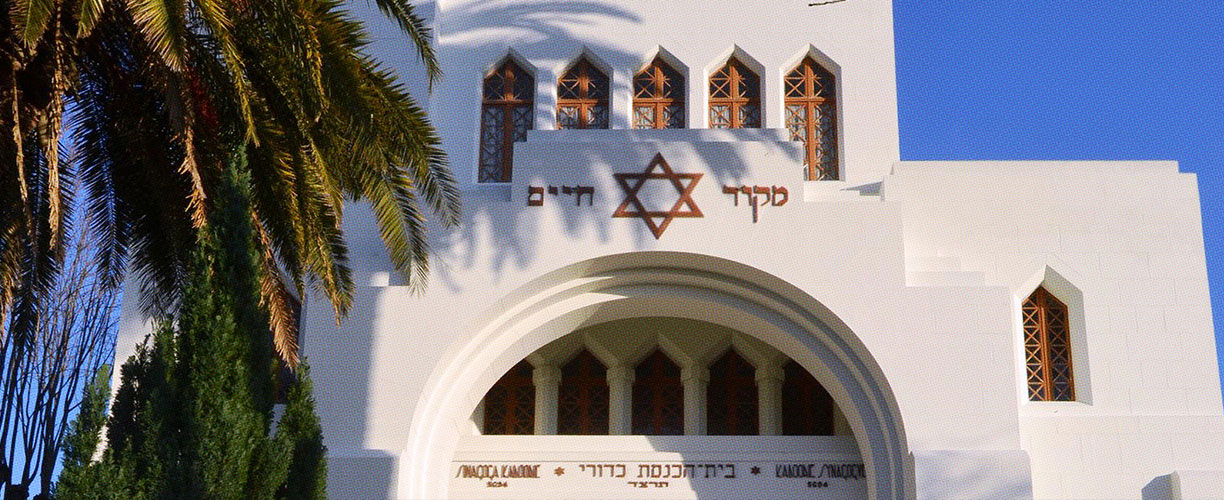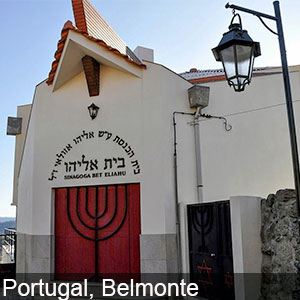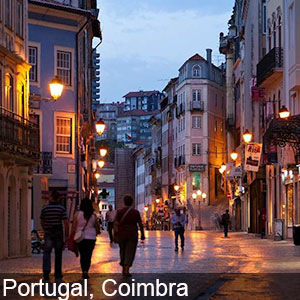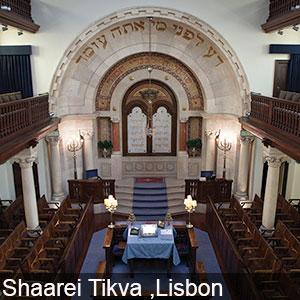
Jewish Portugal
Overview / Highlights
7 NIGHTS / 8 DAYS The Jewish presence in Iberia has existed long before Portugal itself became a country. The contribution of Portuguese Jews to the arts, philosophy, commerce and sciences helped create the rich cultural heritage of this nation. Our unique tour focuses on places of Jewish interest, as well as the fascinating people who continue to contribute to Portuguese society. These descendants of the Inquisition, often referred to as Marranos, are now known as the B'nai Anusim (Children of Oppression). Forced to convert during those awful days, many secretly, and over the centuries, retained their precious Jewish practices, as well as pride in their true heritage. These are the Secret Jews of Portugal - proof, to this day, that our people's soul cannot be vanquished. Staying at Deluxe hotels, you will enjoy both physical luxury and a rare, inimitable Jewish experience!
Tour Program Summery Outline
|
Click |



DAY 1 - Arrive Lisbon (Sintra, Cabo de Roca, Estoril, Cascais)
Welcome to Lisbon, Portugal's charming, hilly, coastal capital city, considered one of the most charismatic and vibrant cities of Europe. It is a city that effortlessly blends traditional heritage, with striking modernism and progressive thinking. Situated along seven cinematic hillsides overlooking the Rio Tejo cradle, Lisbon's postcard-perfect panorama of cobbled alleyways, ancient ruins and white-domed cathedrals - a captivating scene crafted over centuries.Meeting services upon arrival and transfer to the selected hotel.
This afternoon we begin our tour visiting medieval Sintra, a resort town in the foothills of Portugal's Sintra Mountains, boasting a forested terrain and studded with pastel-colored villas and palaces and former summer resort of Portugal's monarchy. Here we visit the Moorish- and Manueline-style Sintra National Palace distinguished by dramatic twin chimneys and elaborate timework. The hilltop 19th-century Pena National Palace is known for a whimsical design and sweeping views. Following lunch we stop at Cabo da Roca is a wild and rugged headland that marks the most westerly point of mainland Europe. The windswept cliffs of Cabo de Roca were believed to be the edge of the world up until the up until the late 14th century and the spectacular, desolate scenery adds to the allure of the location.
Our tour continues as we make our way to the palm-lined promenades of neighboring Estoril. With one of Europe's great 19th century hotels, famous as the setting for James Bond's "Casino Royale," it is a magnet for World War II history buffs. Portugal was neutral and ideally located for spiriting people out of war-torn Europe, and Estoril was a meeting ground and listening post full of international spies, counter-spies, couriers, and freedom fighters of the Resistance.
Nest we visit to Cascais. The Jewish Community first appeared and became organized in Cascais when Pedro I declared the town independent in 1364. Many residents were accused of Judaism, heresy and apostasy throughout the years. Cascais played host to important Jewish personalities not only within the backdrop of Inquisition or of groups of Sephardi Jews who had settled in Portugal, but more particularly during the 1930s and 1940s.
This evening an intimate tour of Lisbon with your own personal walking guide to enjoy an insight into the city's history and traditions. View amazing sites, such as Rossio and Restauradores Square.
Overnight at Lisbon selected hotel.
DAY 2 - Lisbon (Jewish Lisbon, also Castelo de Sao Jorge & Alfama)
Today we visit the historical Jewish sites of Lisbon. Along the way you will discover artifacts, inscriptions, and monuments that no other Jewish tours of Lisbon can access. In May of 2012 a sensational discovery by Archaeologists of Jena University revealed Hebrew inscriptions on stone which point to the Jewish people residing in Portugal as early as 390 C.E. However, some Biblical Archaeologists believe that Tartessian texts found in Southern Portugal in 1922 suggests a Jewish presence dating to the time of King Solomon.Walking through the quaint side streets of Lisbon your guide and historian will explain these recent findings and unveil hidden elements in the architecture, explaining the influence of great Jewish sages like The Abravanel- a philosopher and statesman, and Abraham Zucato who altered the course of the Age of Discovery. The Jews of Portugal throughout history held social and political ranks with the favor of kings, and conciliatory relations between Muslims and Christians alike. However, these periods were equally marked by inquisitions, forced baptisms and brutal massacres which have been overlooked in many historical references. On this tour you will discover the amazing story of Crypto-Jews, (Cristão-Novos) a distinctive sub-group of Sephardim in Portugal who survived over 400 years of persecution in secret. At the site of the Inquisitors Palace, learn little known facts about the Portuguese Inquisition and the controversy of the Marquis of Pombal whose authority destroyed Jewish heritage but saved lives at the same time.
Stand at the deportation point during WWII where thousands of Jewish refugees escaped Nazi persecution, among them famous names like Marc Chagall, Max Ernst and many others who contributed to the arts, sciences and politics of the world stage. Learn about Portugal's own Oskar Schindler, a righteous gentile who is responsible for the single largest rescue mission of WWII, deifying state orders to save thousands feeling the horrors of the 3rd Reich.
Beyond the former Jewish quarters, there are stories in artifacts festooned around the city that will bring deeper understanding of the Early Modern Diaspora, The Passover Massacre, Crypto-Jewish practices and famous Jewish families associated with Portugal. The Lisbon synagogue was inaugurated in 1904. It was the first synagogue to be built in Portugal since the late 15th century. Ventura Terra conceived a temple in a style mixing Neo-Byzantine and Neo-Romanesque, consistent with the Oriental fashion for Synagogue architecture.
It's a lovely synagogue and it's the center of the Portuguese Jewish community.
Explore the historical neighborhoods of Alfama and São Jorge on a 3-hour walking tour of Lisbon. As you stroll the charming streets with a guide, you'll enjoy panoramic views of the Tagus River and marvel at the 12th-century Lisbon Cathedral. Learn about the birth of traditional 'fado' music and discover Lisbon's secret Jewish Quarter as you listen to illuminating commentary.
Overnight at selected hotel in Lisbon (B,L)
DAY 3: Lisbon (City, Sintra, Cabo de Roca, Estoril, Cascais)
Today we tour Lisbon's environs. First stop medieval Sintra, a resort town in the foothills of Portugal's Sintra Mountains, boasting a forested terrain and studded with pastel-colored villas and palaces and former summer resort of Portugal's monarchy. Here we visit the Moorish- and Manueline-style Sintra National Palace distinguished by dramatic twin chimneys and elaborate timework. The hilltop 19th-century Pena National Palace is known for a whimsical design and sweeping views. Following lunch, we stop at Cabo da Roca is a wild and rugged headland that marks the most westerly point of mainland Europe. The windswept cliffs of Cabo de Roca were believed to be the edge of the world up until the up until the late 14th century and the spectacular, desolate scenery adds to the allure of the location.Our tour continues as we make our way to the palm-lined promenades of neighboring Estoril. With one of Europe's great 19th century hotels, famous as the setting for James Bond's "Casino Royale," it is a magnet for World War II history buffs. Portugal was neutral and ideally located for spiriting people out of war-torn Europe, and Estoril was a meeting ground and listening post full of international spies, counter-spies, couriers, and freedom fighters of the Resistance.
Next, we visit Cascais, a delightful Portuguese fishing town, and is the Lisbon's coastline most popular holiday destination. Historically, Cascais was a minor fishing village, until King Luís I (1838 - 1889) choose it as his royal summer retreat. Trailing the Portuguese nobility were the high society of Portugal, who in turn constructed lavish villas, ornate mansions and exquisite gardens. Today, Cascais is an elegant fusion of decorative 19th-century architecture, traditional Portuguese charm and during the summer it is a bustling resort, with a buzzing holiday atmosphere.
The Jewish Community first appeared and became organized in Cascais when Pedro I declared the town independent in 1364. Many residents were accused of Judaism, heresy and apostasy throughout the years. Cascais played host to important Jewish personalities not only within the backdrop of Inquisition or of groups of Sephardim Jews who had settled in Portugal, but more particularly during the 1930s and 1940s.
This afternoon we are back to tour the historical Jewish sites of Lisbon. Along the way you will discover artifacts, inscriptions, and monuments that no other Jewish tours of Lisbon can access. In May of 2012 a sensational discovery by Archaeologists of Jena University revealed Hebrew inscriptions on stone which point to the Jewish people residing in Portugal as early as 390 C.E. However, some Biblical Archaeologists believe that Tartessian texts found in Southern Portugal in 1922 suggests a Jewish presence dating to the time of King Solomon. Walking through the quaint side streets of Lisbon our guide and historian will explain these recent findings and unveil hidden elements in the architecture, explaining the influence of great Jewish sages like The Abravanel- a philosopher and statesman, and Abraham Zucato who altered the course of the Age of Discovery. The Jews of Portugal throughout history held social and political ranks with the favor of kings, and conciliatory relations between Muslims and Christians alike. However, these periods were equally marked by inquisitions, forced baptisms and brutal massacres which have been overlooked in many historical references.
On this tour we will also discover the amazing story of Crypto-Jews, (Cristão-Novos) a distinctive sub-group of Sephardim in Portugal who survived over 400 years of persecution in secret. At the site of the Inquisitors Palace, learn little known facts about the Portuguese Inquisition and the controversy of the Marquis of Pombal whose authority destroyed Jewish heritage but saved lives at the same time.
Dinner is optional and can be arranged by our local guide.
Hotel & Dinner is same as before
DAY 4: Lisbon-Tomar-Coimbra-Porto
This morning we depart Lisbon making our way towards Tomar, a small historic village 145 kilometers north of Lisbon, a fascinating destination as it was the regional strong hold for the Knights Templar religious order. The remains of their fortress and a monastery are still intact and open as a museum. Buried away in one of the narrow streets of the old Jewish quarter rests the oldest existing synagogue in Portugal dating back to 1438. After the forced conversions that followed in 1496; the synagogue was used as a prison, a church, a hay loft and finally a warehouse. In 1921 the building was declared a national monument and in 1939 the owner, Samuel Schwartz donated it to the state for use as a museum. A mikveh was discovered next door during excavations of the outbuilding in 1985. A prosperous Jewish community developed here back in the 14th and 15th centuries in what is called "the lower town", or town below. We will visit the Abraham Zacuto Museum (Abraham Zacuto was a famous Spanish astronomer, astrologer, mathematician, rabbi and historian who served as Royal Astronomer in the 15th century to King John II of Portugal). The Museum displays numerous ancient tablets, gravestones, texts, and artifacts showing all aspects of Jewish life in ancient Portugal.Next, we visit Convent of Christ. In 1983, UNESCO awarded the classification of world heritage to the Templar Castle and the Convent of the Knights of Christ in Tomar, a unique monument in the history of the western world. Here we follow the footsteps of the Knights Templar, a religious-military order full of mysteries with a great treasure that would include the Holy Graal. This order spreads through Europe and Middle East and arrives to the Iberian Peninsula, in the time of the "Christian Reconquista".
Regarded as a holy war, it was centuries of battles between Christians and Muslims in the territory that is nowadays Portugal and Spain and the Knights Templar had a key role in this war and later on the Portuguese Age of Discoveries.
Our next stop Coimba. Rising scenically from the Rio Mondego, Coimbra is an animated city steeped in history. It was Portugal's medieval capital for more than a century and its home to the country's oldest and most prestigious university. Its steeply-stacked historic center dates to Moorish times and is wonderfully atmospheric with its dark cobbled lanes and monumental cathedral. On summer evenings, the city's old stone walls reverberate with the haunting metallic notes of the guitarra (Portuguese guitar) and the full, deep voices of fado singers. The city is at its best during university term time when the students bring a youthful energy to the streets, thronging bars and partying late into the weekend. Their presence also adds a political edge - witness the graffiti scrawled outside the repúblicas (communal student dwellings) addressing the political issues of the day. Time permitting, we will visit the university's famous " Biblioteca Joanina " library, dating back to the 18th century, it was designated as one of the most beautiful libraries in the world.
We continue to Oporto and the Crowne Plaza Porto Hotel located on in the heart of the city's new business district, a 5-star hotel exuding pure luxury and comfort.
Overnight Crowne Plaza Porto Hotel.
DAY 5-Porto (Visit- Trancoso-Belmonte)
This morning we head to Trancoso, a tiny but very important and wealthy Jewish community dating back to the 14th Century. The main reason was that we could find here one of the most important and largest markets in Portugal since the 14th century. We will visit the old Jewish quarter and the modern Isaac Cardoso Interpretation Center of Jewish Culture. Here resided many wealthy Jews, owner of several houses in many streets. They were many and wealthy, more than shoe makers, merchants, weavers or tailors, they loan money, and they were house owners and lived from tenancy. Some had privileges from the king, like David Borcas, Gonçalo Vasques Coutinho servant, Trancoso's mayor dismissed for the communal job.In the 15th century, Trancoso Jews asked King João II to enlarge the synagogue, due to the increasing number of the community, which during the following century was the largest in Beira Interior, with more than five hundred Jews living in Trancoso. After the Portuguese Inquisition establishment (1536), perhaps because of the messianic significance the Jews attributed to Bandarra's Trovas, prophet born in this city , the inquisitors entered in Trancoso and spread the horror among the New Christians.
Nowadays Trancoso's Jewish and New Christian Heritage legacy still lives in the written documents, local traditions and in buildings such as the Gato Preto House, or Poço do Mestre (Master's well), and other dwellings of the historic centre. This legacy contributed to build the Isaac Cardoso's Jewish Cultural Center and Bandarra House.
Next is we head to Belmonte, situated in the remote and beautiful region of Portugal is rich in the history and traditions. While most of the towns in central Portugal are suffering through difficult economic times, this small village northeast of Lisbon is enjoying a revival: The past decade has seen the construction of a luxury hotel and a museum, and tourism is booming. The cause? Jews, or more like the Conversos, to be exact. Belmonte, a town of 3,600, is home to some 300 descendants of Jews who survived the Inquisition by practicing their religion in secret - the only sizable community of these "secret Jews" to remain on the Iberian Peninsula. Until the 1990s, the Belmonte Conversos kept their history to themselves. But since warily emerging from secrecy, the Jews here have generated a small local economy in one of the most economically depressed regions of Western Europe - one that is benefiting Jew and non-Jew alike.
Overnight Belmonte
DAY 6-Belmonte (Covilhã-Castelo de Vide, Museu de Lanificios, Jewish Quarter)
Covilhã : This mountain town is only a few kilometres from the highest point in mainland PortugalIn Covilhã it's fun to see how the town has adapted to its impossible terrain to help you get around on foot, equipping it with a panoramic elevator, funicular trains and the incredible Ponte da Ribeira da Carpinteira pedestrian bridge. It's a town anchored in tradition, and there's a first-rate museum documenting the wool industry, which supported Covilhã for almost 300 years up to the 190s.
Museu de Lanifícios: Covilhã has made a living from wool spinning and weaving since the 1680s,and this heritage is proudly displayed at two former factories in the town: Fábrica de Panos da Covilhã and the Fábrica Real Veiga.
The first location deals with the industry in the 18th century, while the latter focuses on the 19th and 20th centuries. Beginning at the Fábrica de Panos there's an informative video explaining the ins and outs of Covilhã's wool trade. On show at the two locations are old looms, both manual and mechanical, utensils from different eras and an array of textile products made in the town, including yarn, clothing and fabric samples. Continue to Castelo de Vide: Visit the restored synagogue/Museum Overnight in Castelo de Vide.
DAY 7-Castelo de Vide - Évora - Lisbon
Évora: We continue to Évora, standing in the middle of the beautiful plains of the Alentejo. This walled city was declared World Heritage by UNESCO. We will visit see the Roman Temple, dating back to the 3rd century AD and recovered in the 19th century and the strange Chapel of Bones with its pillars and walls covered by bones, from the 17th century.We continue to Lisbon for overnight.
Overnight in Lisbon


